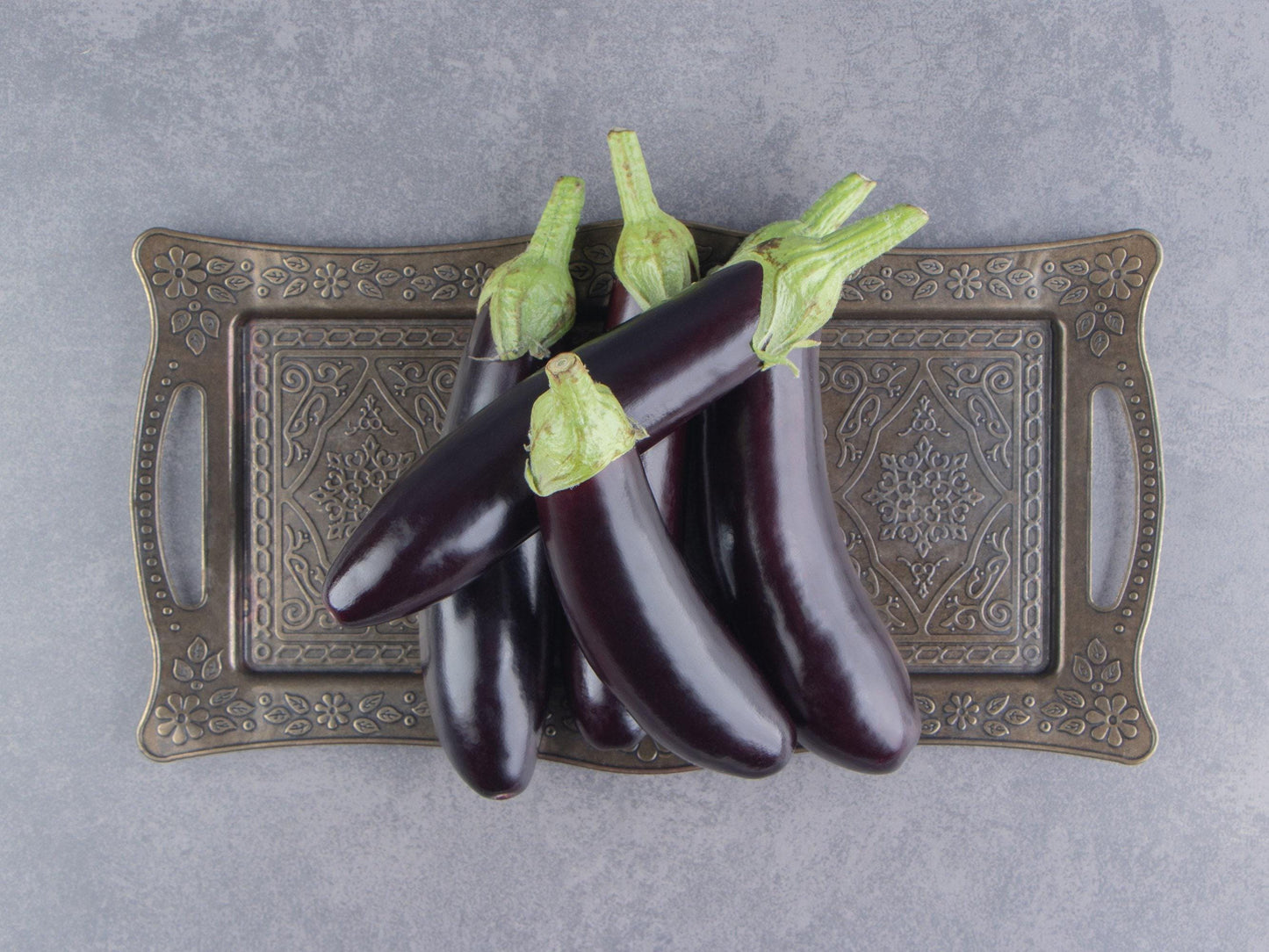Fingerling Eggplant Mix (Solanum melongena) is a delightful heirloom variety known for its small, elongated fruits that come in a variety of colors, from deep purple to striped lavender and white. These mini eggplants have a tender texture and a rich, mild flavor that is perfect for grilling, roasting, or sautéing. Ideal for small gardens or containers, this compact plant is highly productive and can thrive in a range of climates, making it a favorite among home gardeners.
Fingerling Eggplants are easy to grow and maintain, offering continuous harvests throughout the summer. Their eye-catching appearance adds a pop of color to any garden, while their manageable size makes them a fantastic choice for culinary use. This mix includes different varieties of fingerling eggplants, adding a beautiful diversity to your harvest.
SCROLL DOWN FOR DETAILED GROWING INFO
All Nimble NiteCap Seeds are:
• Heirloom
• Organic
• Non-GMO
• Open Pollinated
• Untreated
• US Grown
• Growing instructions included
• Regular testing is conducted to uphold the highest germination standards, all the while employing appropriate seed storage techniques.
Sustainable Packaging & Shipping:
• NimbleNitecap seeds are packed in eco-friendly, compostable seed packets. Seed packets are printed in-house with vegetable-based inks on biodegradable, recycled materials. (Small plastic bags are infrequently used to prevent the loss of very small seeds.)
• All orders are carefully packed and shipped with tracking via USPS First Class (or Priority, if selected) in padded ECOENCLOSE recycled and reusable mailers, or recycled boxes to protect your items in transit.
• Most orders ship out the same or next business day! Please note that this time may be extended during peak season.
• FREE SHIPPING on all orders of $35 or more. Flat Rate shipping no matter how many packets you order.
Common Names: Fingerling Eggplant Mix
Latin Name: Solanum melongena
Type: Fruit-Bearing Vegetable
Life Cycle: Annual
USDA Zones: 4 - 10
Stratification: Not required
Germination Ease: Moderate
Sunlight: Full Sun
Moisture: Prefers consistently moist, well-drained soil
Soil: Well-drained, fertile soil with a pH between 6.0 and 7.0
Height: 18-24 inches
Spread: 18-24 inches
Color: Varied – purple, lavender, white, and striped
Bloom Season: Summer (grown for fruit, not flowers)
Companion Plants: Basil, beans, tomatoes, peppers. Avoid planting near fennel.
Potential Toxicity: Non-toxic to humans and pets
Climate Adaptability: Thrives in warm climates; best grown in USDA Zones 4-10.
~ Sowing ~
When to Sow Outside:
Sow seeds outdoors only in very warm climates, 2-4 weeks after the last frost, when soil temperatures reach at least 70°F (21°C).
When to Start Inside:
For most regions, start seeds indoors 8-10 weeks before the last frost date. Transplant seedlings outdoors when nighttime temperatures are consistently above 55°F (13°C).
Seed Depth:
Sow seeds 1/4 inch deep in well-drained seed-starting mix.
Watering:
Keep soil evenly moist but not waterlogged.
Light and Temperature:
Eggplants require full sun and warm temperatures (75-85°F). Provide supplemental heat indoors if necessary.
Germination:
Seeds typically germinate in 7-14 days.
~ Transplanting Seedlings Outdoors ~
Timing:
Transplant when seedlings have 2-3 true leaves, after the danger of frost has passed and soil temperatures are consistently warm.
Location:
Choose a sunny location with well-drained, fertile soil. Mulch to retain moisture and reduce soil temperatures in hotter climates.
Spacing:
Space plants 18-24 inches apart to ensure ample room for growth and airflow.
Transplanting:
Transplant seedlings gently into the prepared soil. Water well after transplanting to help establish roots.
~ Growing ~
Watering:
Eggplants prefer consistent moisture, so water regularly, especially during fruiting. Avoid overhead watering to prevent leaf diseases.
Fertilizing:
Incorporate compost or a balanced organic fertilizer into the soil before planting. Fertilize again when plants begin to bloom and fruit.
Pest and Disease Management:
Monitor for pests like aphids, flea beetles, and spider mites. Use organic pest control methods if necessary. Ensure good air circulation and avoid waterlogged soil to prevent fungal issues.
Maintenance:
Stake plants as they grow to support the weight of the fruit. Prune excess leaves to improve air circulation and focus energy on fruit production.
~ Harvesting ~
When to Harvest:
Harvest eggplants when the fruits are 4-6 inches long and firm to the touch, but still shiny. Do not allow fruits to become overripe, as this can affect flavor and texture.
How to Harvest:
Cut the fruit off with sharp scissors or a knife, leaving a small portion of the stem attached.
Drying and Storing:
Eggplants are best used fresh, but they can be stored in the refrigerator for up to a week. For longer storage, consider preserving by pickling or freezing.
~ Seed Saving ~
Seed Collection:
Allow a few fruits to fully ripen and turn dull before harvesting. Cut open the fruit, scoop out the seeds, and wash them to remove any pulp.
Seed Cleaning:
Clean the seeds by rinsing them in water, then spread them out to dry completely before storing.
Seed Storage:
Store dried seeds in a cool, dry place. Properly stored seeds remain viable for up to 3 years.
~ Additional Information ~
Forage for Pollinators:
Eggplant flowers are attractive to bees, which help pollinate the plants for better fruit production.
Origin:
Eggplants are native to Asia and have been cultivated for over 1,500 years. Fingerling varieties are prized for their smaller size and tender texture.
Nomenclature:
Solanum melongena, the Latin name for eggplant, is derived from the Italian word "melanzana." In some regions, eggplants are also known as "aubergines."
History:
The fingerling varieties were developed for their smaller, gourmet-sized fruits, ideal for specialty dishes. The diverse colors in this mix make them a fun and attractive addition to gardens and farmers’ markets.
Potential Toxicity:
Non-toxic and safe for humans and pets.
Climate Adaptability:
Fingerling eggplants thrive in warm temperatures and sunny conditions but can be grown successfully in a variety of climates with proper care.



















